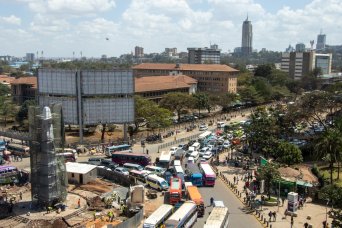- About
- Topics
- Story
- In-Depth
- Picks
- Opinion
- News
- Donate
- Signup for our newsletterOur Editors' Best Picks.Send
Read, Debate: Engage.
| topic: | Renewables |
|---|---|
| located: | Ghana, Ethiopia, Rwanda |
| editor: | Bob Koigi |
Globally, an estimated one quarter of all greenhouse has emissions generated by energy consumption are from the transport sector, with up to 95 percent of the world’s transport energy coming from fossil fuels. A lot of emphasis has been placed on the differences in contribution of the transport sectors between developed countries and countries in Africa, which have some of the lowest motorisation rates worldwide. Nevertheless, as the continent industrialises, and its rate of urban population soars, African countries are finding themselves grappling with unhealthy and unsustainable transport systems.
Africa’s major and fastest growing cities, such as Lagos, Cairo, Johannesburg, Accra and Nairobi, are choking under trails of soot that have fanned air pollution, which has taken a toll on people’s health and the environment. One-in-nine deaths are caused by air pollution and an estimated nine out of 10 people breathe unclean air, the UNEP Pollution Dashboard indicates.
In countries like Ghana, air pollution is said to cost the economy up to $2.5 billion each year. With Africa’s urban population poised to double by 2050, the situation can only escalate if nothing is done.
Yet Africa’s vast renewable energy resources, coupled with its youthful and aggressive workforce, are some of its greatest assets in decarbonising the transport sector and transitioning to healthy and sustainable alternatives. The various commitments that have been expressed, if actualised, could point the continent to the environmental, economic, health and infrastructure benefits of low-carbon transport.
The African Union, in its quest for net-zero emissions, has highlighted access to clean and safe vehicles, reliable energy for maritime transport, alternative fuels and reduction in air-transport emissions as drivers towards that goal.
Ethiopia, under its Climate Resilient Green Economy strategy, is pushing for interventions that support public transport, including non-motorised options, and a move toward cleaner fuels for freight and shipping.
Rwanda, on the other hand, has set a target of converting 20 percent of its public transportation to electric vehicles by 2030 as part of the Green Growth and Climate Resilience Strategy - a blueprint for a low-carbon economy for 2050. More African countries have developed green and climate-smart transport strategies and policies
These ambitious targets, if and when achieved, will be key in securing sustainable mobility for all at a time when taming carbon emissions remains a matter of urgency if we are to halt the global climate crisis.
Photo by Michael Njoroge

